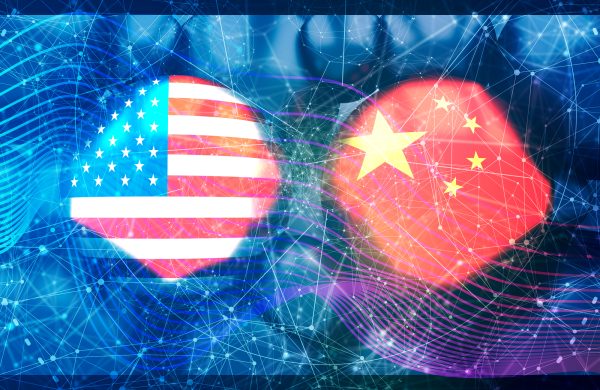As artificial intelligence (AI) barrels into every facet of life, its relentless momentum brings escalating perils. Differing attitudes toward governance have forked the policy roadmaps of two AI superpowers: China and the United States. With the most advanced AI capabilities and industries globally, both countries set influential norms that ripple worldwide. Their regulations carry global significance as an AI arms race unfolds between the two fierce rivals.
In the United States, comprehensive AI legislation has been extremely slow to materialize, if not completely absent. Substantial investments have been made in AI R&D, yet governance remains decentralized and inconsistent. The U.S. lacks a unified AI strategy similar to the European Union’s upcoming Artificial Intelligence Act. Instead, Washington is taking a fragmented approach spread across voluntary recommendations and non-binding regulations.
With limited bipartisan appetite for sweeping AI legislation, targeted laws concentrated on urgent issues like privacy may be more viable in the near term. After all, given that the concept of the right of privacy was arguably popularized by Supreme Court Justice Louis Brandeis over a century ago, a federal data privacy law akin to the EU’s General Data Protection Regulation remains long overdue. While regulators have been slow to act, signs point to Main Street demanding oversight to rein in AI’s risks before the genie fully escapes from the bottle.
On the other hand, China is commonly portrayed as readily compromising governance to enable security-focused AI applications, but that is an oversimplification. While stability remains an imperative, Chinese attitudes are evolving as citizens are increasingly scrutinizing AI-enabled surveillance policies. Coupled with new regulations on generative models, China is demonstrating more nuanced oversight – though still favoring pragmatic balance over hard limits on innovation.
China’s overall stance can be gleaned from statements made by the State Council, which emphasized AI’s “irreplaceable role” in maintaining stability. This mindset spawned China’s AI-enabled social credit system, founded on exhaustive data gathering to incentivize compliance through carrots and sticks. While dystopian to Western sensibilities, many Chinese citizens tolerate or even welcome benefits like tax breaks and transport discounts. This has led some to argue that China has historically permitted privacy forfeiture for stability.
However, the true picture is less black and white. When Baidu co-founder Robin Li controversially proclaimed in 2018 that Chinese people care less about personal privacy than their Western counterparts, his remarks drew a groundswell of disapproval from outraged Chinese netizens. While providing convenient validation for certain perspectives abroad, Li’s stance clearly clashed with rising disquiet among ordinary Chinese regarding data misuse, as surveys have shown.
In reality, on AI governance, China treads a far more common path than some depictions suggest. As in most countries, public opinion remains deeply split on boundaries for data use by AI systems, diverging sharply across demographic lines. This is partly due to a generational rift, with the cohort least bothered by AI’s ramifications poised to be the most impacted. Oversharing on social media platforms, for example, remains reflexive among the generation that grew up with smartphones. The indifference of young users coupled with exploitable systems serves up easy pickings for predatory data collection and monitoring activities enabled by AI technologies.
In light of these complex dynamics, the narrative that the Chinese government disregards AI concerns is a simplification to the point of inaccuracy. In recent years, privacy-related penalties and restrictions imposed against tech firms – including sanctioning the ride-share firm Didi – have been meted out with increasing regularity. China’s regulatory bodies are actively striving to balance security interests with desires for reduced restraints on innovation. Recurring data breaches show gaps in safeguards, but regulations do continue to evolve in measured phases.
While stronger regulations have largely flowed from the central government down, grassroots advocacy campaigns also apply additional pressure. According to leaked documents, Hangzhou city authorities had secretly hatched plans to roll out a health application to score citizens on behaviors like exercising, smoking, and sleep patterns. But when word got out, domestic indignation led authorities to scrap the contentious initiative.
The recent debate around AI-enabled facial recognition technology usage brings China’s shifting attitude into even sharper relief. While rapidly adopted for public security uses, the expansive use of facial recognition tech stirred intense public opposition. The first controversy emerged in 2019, when a university professor filed a lawsuit challenging the use of the technology in a wildlife park in Hangzhou. A 2021 poll found most Chinese residents oppose the technology’s use in commercial and even residential areas.
Though initially lethargic to respond, authorities are now grappling with public opposition to pervasive biometric monitoring. China’s internet regulator, the Cyberspace Administration of China (CAC), responded with swift policy updates. The agency requires companies to obtain citizen consent for using facial recognition technology, and offer alternatives where feasible. This shift demonstrates increased oversight as Beijing works to rein in overuse of a ubiquitous technology China itself helped spread globally.
China’s overriding stability focus means some degree of AI-enabled state surveillance will inevitably persist. When collective and individual interests collide, China still prioritizes the former. But dismissing individual voices as inconsequential underestimates rising criticism among the populace. Public opinion does help shape evolving technology policies in China, just as it does elsewhere.
As China continues weighing stability imperatives amid rapid technological change, new profound questions around responsible governance keep arising. On August 15, China blueprinted a pioneering law that places restrictions on the development of generative AI technology.
However, we should not assume that the new laws reveal China’s aim to choke off generative AI. Mere weeks after the regulations took effect, eight major Chinese tech companies, including heavyweights like Baidu and SenseTime, obtained CAC approval to deploy their conversational AI services. While cautious of potential risks, regulators appear to have sought to foster growth within newly established ethical guardrails, rather than impose sweeping barriers.
This attitude diverges sharply from the more laissez-faire approach of the other AI leader, the United States – redirecting focus to the challenges confronted by the Biden’s administration in keeping pace with technological change. With a historical penchant for industry self-regulation and after-the-fact interventions for harmful applications, the United States now lags behind in AI governance.
As technology companies continue to keyboard new AI innovations at a blinding tempo, the U.S. government remains stuck in first gear. This inability to quickly legislate AI’s growth and risks highlights the yawning gap between the government’s ponderous legislative process and technology’s breakneck pace. In fact, if this relatively hands-off stance of the United States persists, some argue that it might leave the country vulnerable, as reflected in concerns around possible AI disruptions in the upcoming 2024 elections.
But the tide might turn soon. The recent swell of public interest and Congressional hearings focused on AI governance may compel more substantive action. In an opinion piece, the chair of the Federal Trade Commission (FTC), Lina Khan, highlighted the risks associated with AI such as AI-enabled fraud, discriminatory outcomes, and privacy violations. She avowed that the FTC would ratchet up its enforcement effort to fulfill its dual mission of promoting “fair competition and to protect Americans from unfair or deceptive practices.”
Major AI companies such as Microsoft, Google, and Meta are also taking matters into their own hands, proactively self-regulating in hopes of shaping external oversight on their terms. However, self-regulation alone has proven to be impotent without the force of law under the aegis of government oversight.
Given AI’s profound societal impacts, from automation’s economic disruption to generative models’ security risks, further examination of potential U.S. policies is warranted despite the slow progress so far. Momentum for change in Washington could be imminent thanks to mounting public pressure. This past June, Senate Majority Leader Chuck Schumer expressed his support for regulating AI technologies, declaring that he has heard the public’s demands for action “loud and clear” and promised swift legislation.
Targeted federal laws zeroing in on pressing issues like algorithmic bias, data privacy, or disinformation spawned by generative models may emerge first through bipartisan cooperation. After all, being the birthplace of groundbreaking generative AI technologies like ChatGPT that captivated global attention, the United States bears a moral obligation to spearhead responsible governance over such innovations. Its leadership role means its policies set the tone for others to follow.
China’s governance of AI similarly shows signs of shifting. While still beholden to some degree of surveillance for stability, its government is increasingly aligning with public attitudes rather than just official principles.
The divergent paths charted by China and the United States sprung from each nation’s unique culture and ethical priorities. However, signs point to possible future convergence as both countries increasingly recognize the need for multifaceted governance balancing societal benefits and individual liberties.
What remains vital is that neither priority can categorically override the other. As the technology pendulum swings, all countries, not just China and the United States, must continue striving for policies that enable AI’s positive potential as a necessary pursuit.





















Discussion about this post